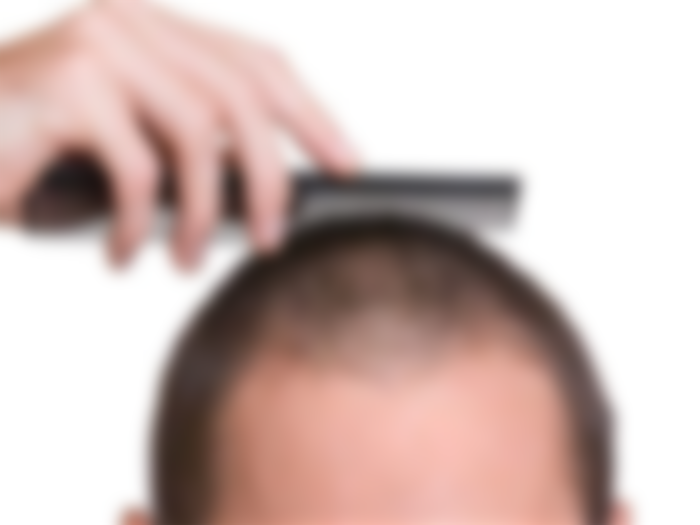Everything you need to know about hair loss
Hair loss, which is an extremely common problem among the public, can only affect your scalp or the hair on your entire body. Although it is usually common in older adults, it can occasionally occur in children as well. Experts accept the loss of 50-100 strands of hair per day as normal. Considering that there are about 100,000 hairs on your scalp, it is quite natural that you do not notice this small loss.
Normally, the shed hair is replaced by a new one, but this may not always happen. Hair loss may develop gradually over the years or may occur suddenly. This problem can be permanent or temporary.

It is not possible to count the amount of hair you lose in a day. If you notice that there is a lot of hair in the shower after washing your hair or you have hairballs on your comb, you may be experiencing more hair loss than usual. You may also notice that your hair is thinning out or that some areas are balding.
If you think you have been experiencing increased hair loss recently, consult your doctor. In order to eliminate hair loss, the underlying cause must first be determined. The person who will know this best is your doctor.
For all your questions about hair loss, read on.
Hair loss (alopecia), as we mentioned above, can only affect your scalp or your whole body. This common problem can be a normal part of genetics, hormonal changes, medical conditions, or aging. Every person can experience hair loss, but it is more common in men.
Baldness typically refers to the excessive shedding of hair from your scalp. Hereditary hair loss with age is the most common cause of baldness. Some people choose to let their hair loss run its course without treatment and concealment. Some can hide it with hairstyles, hats or scarves. Others may choose one of the available treatments to prevent hair loss or restore hair growth.

Hair loss symptoms
Hair loss can occur in many different ways, depending on what is causing the condition. It can develop suddenly or gradually. Symptoms of hair loss may include:
Gradual thinning of the top of the head: This is the most common type of hair loss that affects people as they age. In men, hair usually begins to recede from the hairline on the forehead. An increasingly common pattern of hair loss in older women is hairline regression (Frontal fibrosing alopecia).
Circular or irregular bald spots: Some people lose hair from circular or patchy bald spots on the scalp, beard, or eyebrows. Before hair loss, your skin may become itchy or sore.
Sudden hair loss: A physical or emotional shock can cause hair loss. When combing or washing your hair, even after lightly tugging, you can lose handfuls of hair. This type of hair loss usually causes general hair thinning, but is temporary.
Whole body hair loss: Some conditions and medical treatments, such as chemotherapy treatment, can cause hair loss all over your body. In such cases, hair and quills usually grow back.
Scaly patches spreading to the scalp: This is usually a sign of ringworm. Symptoms may be accompanied by broken hair, redness, swelling, and sometimes tingling.
Causes of hair loss
What causes hair loss? First, your doctor or dermatologist will try to determine the underlying cause of your hair loss. The most common cause of hair loss is male pattern hair loss or female pattern baldness. The causes of hair loss can be briefly listed as follows:
If you have a family history of baldness, you may have this type of hair loss. Some hormones can trigger hereditary hair loss. In such cases, hair loss can start as early as puberty.
Sometimes hair loss can occur with a simple stop in the hair growth cycle. Significant diseases, surgeries or traumatic events can trigger hair loss. However, your hair often starts to grow back without treatment.
Hormonal changes can cause temporary hair loss. Examples include:
-Pregnancy
-Birth
- Quitting the use of birth control pills
-Menopause
Medical conditions that can cause hair loss include:
-thyroid disease
-Alopecia areata (An autoimmune disease that attacks hair follicles)
Scalp infections such as ringworm

Diseases that cause scarring, such as lichen planus and some types of lupus, can cause permanent hair loss due to scarring.
Hair loss; It can also be caused by medications used to treat conditions such as high blood pressure, arthritis, depression, heart problems.
A physical or emotional shock can trigger visible hair loss. Examples of such shocks include:
-One death in the family
-Excessive weight loss
-High fever
People with trichotillomania (hair pulling disorder) experience the need to pull their hair, usually from their head, eyebrows or eyelashes.
Hair loss can be caused by hairstyles that pull the hair back too tightly and put pressure on the follicles.
A diet lacking in protein, iron, and other nutrients can also cause hair thinning.
Hair loss treatment: What should be done for hair loss?
You now have information about what is hair loss and the causes of hair loss. Permanent hair loss usually indicates an underlying health problem. Your doctor or dermatologist can determine the cause of your hair loss based on your physical examination and health history. In some cases, simple dietary changes can help solve the problem. Your doctor may also change your prescription medications. The following options can be mentioned about hair loss treatment:
Medication
Medications will likely be the first line of treatment for hair loss. Over-the-counter medications usually consist of topical creams and gels applied directly to the scalp. Prescription medications can also treat hair loss.

Medical procedures
Sometimes medications are not enough to stop hair loss. At this point, surgical procedures that can be preferred for the treatment of baldness come into play. These may include hair transplantation. Hair transplantation works well for people with hereditary baldness because people with it typically lose hair on the top of the head.
Hair loss can be stopped or reversed with the right treatment, especially if it's caused by an underlying medical condition. Hereditary hair loss can be more difficult to treat. However, some procedures, such as hair transplants, can help reduce the appearance of baldness.



